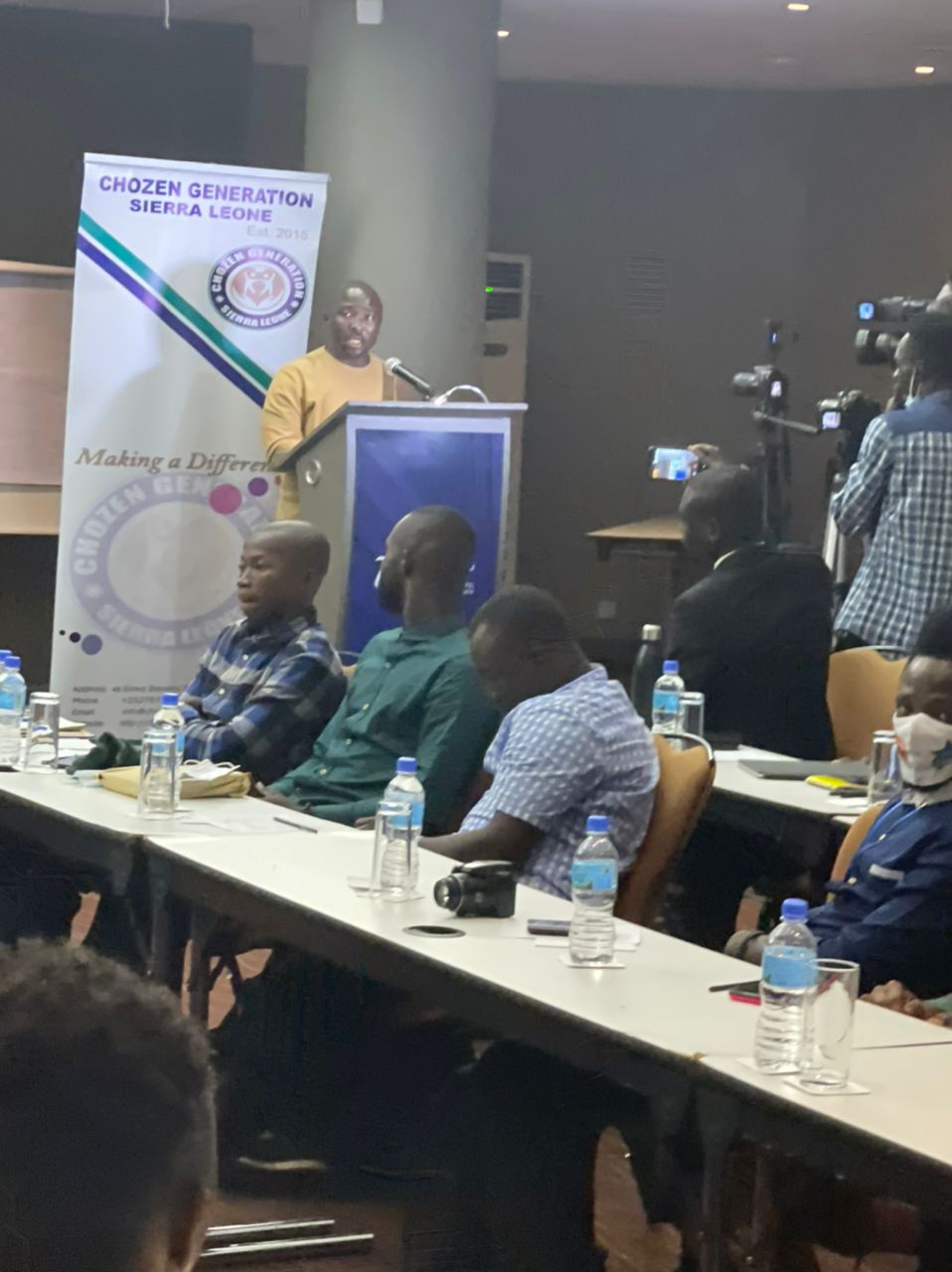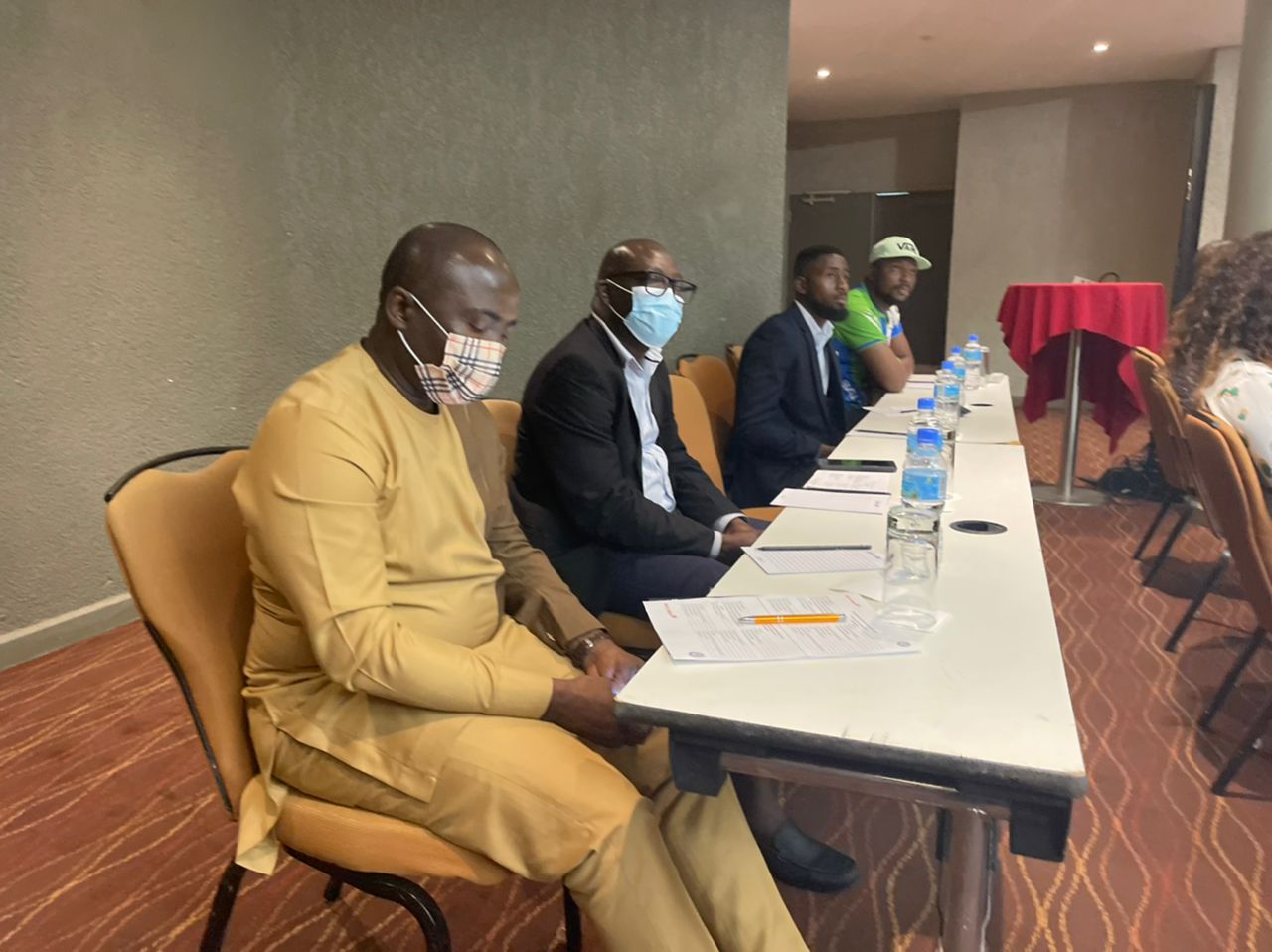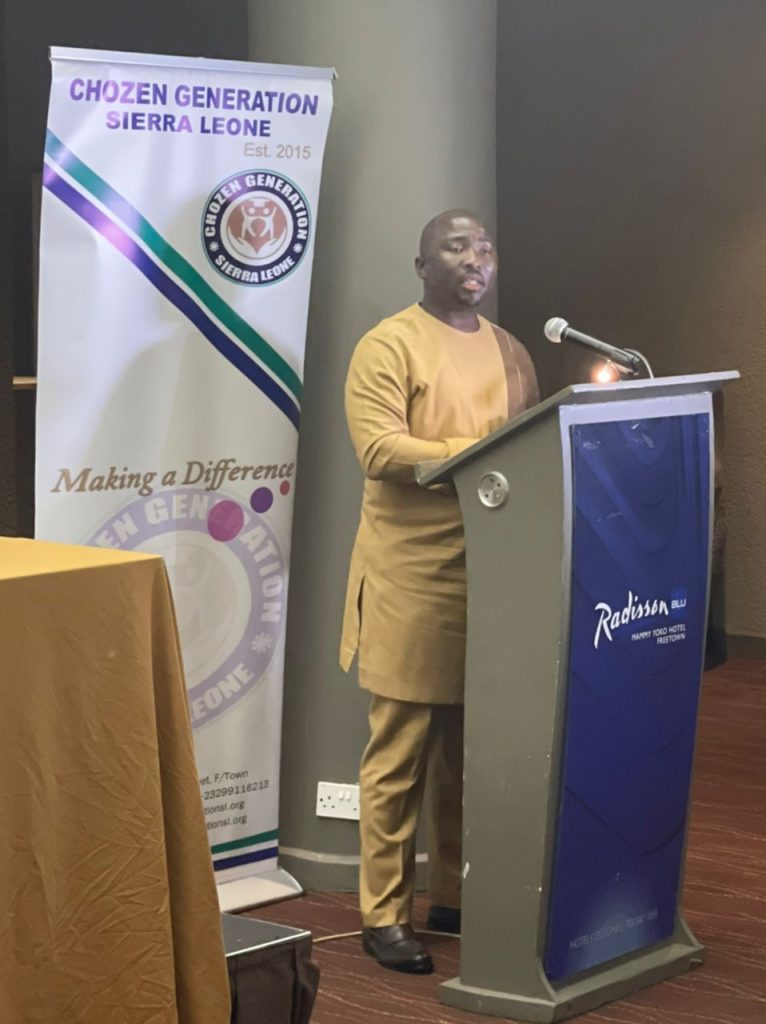Keynote Address at the Chozen Generation-organized discussion on data rights and related matters -held at Radisson Blu, Aberdeen, Freetown, Thursday, November 19, 2021
Keynote address titled: An open, connected and regulated communications ecosystem in Sierra Leone
Prepared and delivered by
Solomon A.J Jamiru Esq
Deputy Minister of Information & Communications
DOWNLOAD Keynote Address on Data Rights and Protection OF THIS KEYNOTE ADDRESS

A lot is evolving in the communications space in Sierra Leone, and as a Ministry, we appreciate the courtesy accorded us to lend the government’s perspective to the discourse. This address will therefore speak to the high-impact public policy interventions which our Ministry, together with development and civil society partners, continue to midwife. Government is not only committed to digital transformation and getting our society open and connected, but equally interested in digital regulatory frameworks that are reasonably justifiable in a democratic society. Indeed, Facebook CEO Mark Zuckerberg, in February 2020, called on governments to provide guidelines and regulations to help tackle the growing problem of harmful online content.
The right to free speech gained its first meaningful constitutional recognition in Sierra Leone exactly 79 years after the US Supreme Court started giving it some attention. Following the passing in 1917 of the Espionage Act, the US Supreme Court declared in 1919 that “Congress shall make no law abridging the freedom of speech or of the press”.
A century after the US Supreme Court gave that initial interpretation to the first amendment right, in the case of Federation of African Journalists & Others versus The Gambia, the Community Court of ECOWAS castigated criminal sanctions for sedition, defamation, and false news. In the words of the court, such sanctions pose “a chilling effect that may unduly restrict the exercise of freedom of expression of journalists”.
Consistent therefore with Section 25 of the Constitution of Sierra Leone, Act No. 6 of 1991, which guarantees protection of freedom of expression and the press, President Julius Maada Bio met with the SLAJ Executive on 21st May 2018, reiterating his manifesto promise to decriminalize free speech. And on October 28, 2020, His Excellency’s assent to the amended 1965 Public Order Act, marked the complete removal of the 55 year-old sword of Damocles.
Government is equally committed to our interaction in the cyber space and the protection of personal data rights. As we are all aware, the world has come a long way in the evolution of privacy rights. From the US lawyers Samuel D. Warren and Louis Brandeis, who in 1890, defined privacy as the right to be left alone; to 58 years later when the UDHR adopted the right to privacy as the 12th fundamental right; to 1967 when the US enacted the Freedom of Information Act which gave everyone the right to request from state agencies, access to documents; to 1981 when the Council of Europe made the right to privacy a legal imperative, and so on and so forth.
So data protection and Cybersecurity are at the heart of public policy. The Journal of Cyber Policy (a Chatham House) publication, in volume 4 of 2019, identified cybersecurity as a priority for leaders. It noted how cyberattacks and data breaches can devastate businesses, for example causing approximately $600 billion financial losses in 2017; and suggesting that cyber risk often results from poor governance. So it is extremely important that we try to manage it from the top down.
Like many other countries in Africa, Sierra Leone’s interest in increased digital governance was actually triggered by the 2014 Malabo Convention on Cybersecurity and Personal Data Protection (which called for a homogeneous data protection framework for Africa) and shortly afterward, the 2016 General Data Protection Regulation of the European Union.
Sierra Leone witnessed how African countries such as Kenya, Nigeria, Togo, and Uganda adopted Data Protection policies in 2019, followed by Rwanda and Egypt in 2020; and South Africa also enacted the Protection of Personal Information Act in 2020.
DOWNLOAD Keynote Address on Data Rights and Protection OF THIS KEYNOTE ADDRESS
I have deliberately set out the above to establish some broad principles and precepts underpinning Sierra Leone’s steps towards the governance of the digital space and ensuring that our rights online are as protected as they are offline.
His Excellency President Julius Maada Bio took an oath to faithfully uphold and defend the constitution of Sierra Leone. And our privacy right is one of those which is guaranteed in Section 22 of the 1991 Constitution, ensuring that no person (unless with his consent) is subjected to the search of his person or his property or the entry by others on his premises, or interference with his correspondence, telephone conversation, and telegraphic and electronic communication.
I am pleased to inform you that following Cabinet’s approval for drafting and enactment of a Data Protection law, the Ministry is currently working with NCRA to have extensive consultation and validation of the draft. The legislation will bear the relevant hallmarks of a personal data protection instrument, and quite aligned with our civil liberties. It will ensure lawful, fair, and transparent processing of our data; accuracy of data and collection of data for clearly defined and legitimate purposes; storage of data no longer than the period necessary; as well as guaranteeing the security, integrity, and confidentiality of our personal data.

Sierra Leone’s policy and regulatory environment for personal data collection, processing, transmission, storage, and use will derive in part from very instructive international and regional frameworks, including the AU Convention on Cyber Security and Personal Data Protection adopted in Malabo in 2014, the ECOWAS Supplementary Act on Personal Data Protection of 2010, and the EU General Data Protection Regulation 2016.
Yesterday, His Excellency President Bio signed into law the Cyber Security and Crime Bill 2021. The Act provides legal safeguards for cybercrimes, criminalizes over 20 offenses including illegal access and interceptions, child pornography, cyber harassment, and the Act enables the use of electronic evidence.
The data protection provisions in this law are also comforting to note. In Section 10 of the Act, for instance, search and seizure of stored computer data by a police officer or any authorized person in the course of an investigation, will only be possible upon an application made to a Judge of the High Court, canvassing reasonable grounds, and a warrant issued for that purpose.
It is in a similar token that a service provider (let’s say a mobile network operator or internet service provider) cannot be compelled to submit any information in its possession or control relating to a subscriber, unless by warrant under the hand of a High Court judge pursuant to Section 12 of the Act. And in producing such requested data, the Act guarantees the privacy of other users, customers, and third parties, and protects the disclosure of data belonging to any person that is not a party to the investigation.
The Act also sets a very high bar for the collection of real-time traffic data under Section 14 and interception of content data under the Act.
Section 37(1) (C) of the Telecommunications Act 2006, provides for the privacy of communication as one of the rights and privileges of customers of telecommunications services.
Section 40 of the National Civil Registration Act 2016 also protects data from unauthorized access, loss, and destruction.
Privacy of information is further guaranteed in part under Sections 19,20 and 21 of The Right to Access Information Act 2013; and the accompanying regulations when sanctioned by Parliament, will provide strong mechanisms.
The examples cited are consistent with our fundamental right to privacy enshrined in Section 22 of the Constitution.
But on the broader spectrum, Sierra Leone will soon finalize its National Digital Transformation Policy and Strategy with support from Digital Impact Alliance in partnership with Smart Africa; and with a $50M support from the World Bank, will implement the strategy to ensure tangible interventions in some critical areas. The policy entails the establishment of a National Digital Transformation Agency which will serve as the main coordination and implementation agency for national ICT development initiatives including e-governance, Cyber Security, and data protection.
I am pleased to note that Government has approved and adopted some of the legislations that are key to the digital economy, including the Cyber Security and Crime Act. Let me also mention the Electronic Communications Bill, which when enacted, will repeal and replace the Telecommunications Act of 2006. This law will in the coming days be gazetted and head to Parliament for enactment.
The Ministry has completed the draft 5-year National Cybersecurity Strategy and Policy with support from the UK Foreign and Commonwealth Office (FCO), and set for Cabinet approval before the end of December 2021.
The Ministry is working with ECOWAS to build incident detection and threat monitoring capability and to secure relevant equipment for the functioning of the Computer Emergency Response Team (CERT).
But all of these commendable steps will be meaningless in the absence of digital skills. The recent Sierra Leone digital economy country diagnostic conducted by the World Bank, revealed digital skills challenges in the country. Most of the schools are lacking digital connectivity, compounded by limited power supply in rural areas. Basic digital skills acquisition is therefore impeded by the overall lack of digital connectivity. Broadening the digital space is therefore intrinsically linked to digital skills development and maturity in Sierra Leone. The Ministry will work with the World Bank to develop a national baseline assessment framework for digital skills which will inform Sierra Leone’s digital skills agenda.
So, let me reiterate that Government remains fully committed not just to addressing gaps in privacy rights, but as half the world remains offline, we aspire to create an inclusive digital ecosystem; and in that regard, would prioritize the following:
- Digital infrastructure, to enable our people and businesses connect online with services here and across the world;
- Make information accessible through digital channels like mobile handsets, computers, and the internet, and enhance the citizens-government interface more so in exercising the right to access information;
- Pursue digital literacy and other skills set so that our people become digitally savvy and an important part of the 4th
DOWNLOAD Keynote Address on Data Rights and Protection OF THIS KEYNOTE ADDRESS
